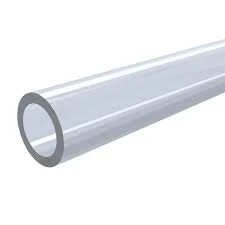Nov . 12, 2024 01:22 Back to list
4 inch pvc irrigation pipe
The Versatility of 4-Inch PVC Irrigation Pipe in Modern Agriculture
In the realm of modern agriculture, effective irrigation systems are vital for ensuring crop health and maximizing yields. Among the various materials and designs available for irrigation, the 4-inch PVC (Polyvinyl Chloride) irrigation pipe has emerged as a preferred choice for farmers and agricultural engineers alike. This article delves into the advantages, applications, and installation practices of 4-inch PVC irrigation pipes, highlighting their significant role in water management and sustainable farming.
Advantages of 4-Inch PVC Irrigation Pipe
One of the primary benefits of using 4-inch PVC irrigation pipes is their durability. PVC is resistant to corrosion, rust, and chemical degradation, which makes it ideal for holding water and transporting it over long distances. Unlike metal pipes, PVC pipes do not corrode or react with the soil’s chemicals, ensuring a longer lifespan and lower maintenance costs. Additionally, the smooth interior of PVC pipes minimizes friction loss, allowing for efficient water flow and reduced energy consumption in pumping systems.
Another crucial advantage is the lightweight nature of PVC. This characteristic makes transportation and installation significantly easier compared to heavier materials like metal or concrete. Farmers can handle these pipes with minimal equipment, which reduces labor costs and increases efficiency during setup. The ease of installation also means that irrigation systems can be constructed or modified quickly, accommodating the changing needs of farm operations.
Applications in Agriculture
4-inch PVC irrigation pipes are versatile and can be used in various irrigation systems, such as drip irrigation, sprinkler systems, and surface irrigation. They are particularly effective in transporting large volumes of water from a source, such as a well or reservoir, to different parts of a farm.
In drip irrigation systems, for example, the 4-inch PVC pipe can serve as a mainline to distribute water efficiently to smaller lateral lines. This method conserves water by delivering it directly to the plant roots, minimizing evaporation and runoff. As water scarcity becomes an increasingly pressing issue, using PVC pipes in drip systems supports sustainable water management practices.
Furthermore, in sprinkler irrigation systems, 4-inch pipes can be utilized to distribute pressurized water to a network of sprinklers that cover the field evenly. This ensures that crops receive adequate moisture, ultimately enhancing growth and productivity.
4 inch pvc irrigation pipe

Environmental Considerations
The use of 4-inch PVC irrigation pipes also aligns with sustainable agricultural practices. By promoting efficient water usage, PVC pipes help reduce water waste, ensuring that resources are utilized judiciously. Additionally, their longevity means that the environmental impact associated with frequent replacement and disposal is minimized.
Furthermore, PVC is a recyclable material. Although it must be appropriately processed to be repurposed, the potential for recycling contributes to a circular economy in agriculture. As farmers increasingly prioritize sustainability, opting for PVC pipes with environmentally friendly designs can be a step towards greener farming practices.
Installation Best Practices
To maximize the efficiency and longevity of 4-inch PVC irrigation pipes, proper installation is essential. When installing these pipes, it is crucial to choose the correct size and schedule (wall thickness) depending on the system's pressure and flow requirements. The pipes should be laid in trenches that are deep enough to protect them from physical damage while also allowing for proper installation and maintenance.
Jointing is another critical aspect of installation. Solvent cement is typically used to bond PVC pipes and fittings securely. Ensuring that the pipe ends are clean and properly prepared before applying the adhesive will prevent leaks and enhance the integrity of the system.
Regular maintenance checks should also be scheduled to assess for clogs or leaks, ensuring that the irrigation system performs at its best. Cleaning filters and flushing out the system periodically can prevent debris buildup and ensure efficient water flow.
Conclusion
In summary, the 4-inch PVC irrigation pipe stands out as an indispensable tool in modern agriculture. Its durability, ease of installation, versatility in application, and environmental benefits make it a top choice for farmers looking to implement efficient and sustainable irrigation systems. As the agricultural sector continues to evolve with advancements in technology and irrigation practices, the role of PVC pipes will likely grow, providing solutions that enhance productivity while conserving our precious water resources. By investing in quality irrigation infrastructure, farmers can foster healthier crops and contribute to a more sustainable future for agriculture.
-
High-Quality PPR Pipes and Fittings Durable ERA PPR & PVC PPR Solutions
NewsJul.08,2025
-
Black HDPE Cutting Board - Durable, Non-Porous & Food Safe HDPE Plastic Cutting Board
NewsJul.08,2025
-
High-Quality CPVC Panel Durable HDPE & PVC Panels Supplier
NewsJul.08,2025
-
Double PE Welding Rod Supplier - High Strength, Durable & Versatile Welding Solutions
NewsJul.07,2025
-
High-Quality PVC-O Pipe Supplier Durable 75mm PVC Pipe & Connections Leading PVC Pipe Company
NewsJul.07,2025
-
HDPE Drainage Pipe Supplier – Durable & Corrosion-Resistant Solutions
NewsJul.06,2025

